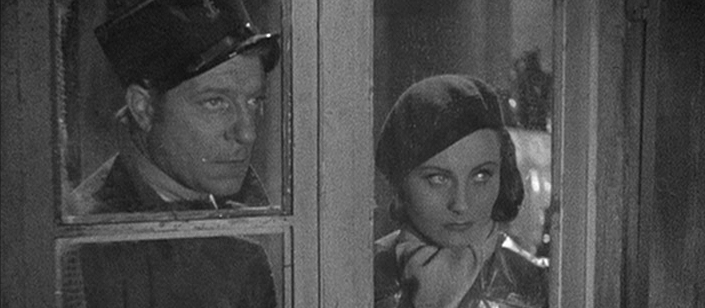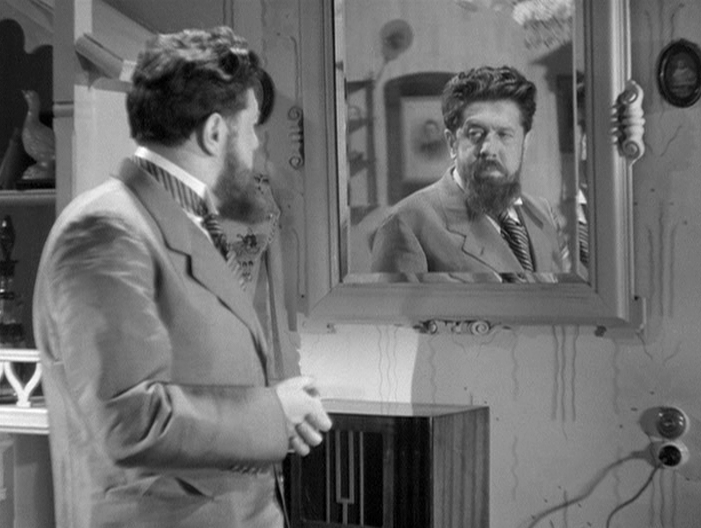

“Using a gun looks easy. Like shooting wooden ducks at a fair. You shoot and then some guy screams. He holds his stomach and makes a face like a kid with a bellyache. His hands turn red, and then he drops. You’re left standing there. You don’t understand a thing. Like everything around you has disappeared.”
Fog is a great metaphor to utilize in poetic storytelling. Of course, physical fog can obscure vision; but mental fog can cloud a man’s judgement, and an incorporeal fog can obscure the connections between people. In Marcel Carné’s Port of Shadows a general sense of fogginess envelopes the characters—an assortment of desperate people unsure of what they are searching for, let alone where to find it, plagued by helplessness and despair.
Released in 1938, the film stars Jean Gabin as a fatalistic AWOL soldier seeking a new identity in the city of Le Havre, France. He hitches a ride into town with an amiable truck driver who offers him a cigarette and treats him kindly, but the two nearly come to blows when Jean (the character has the same name as the actor) forces the truck off the road in order to avoid hitting a dog. Jean confesses to having some mental struggles due to his time in the military, and the two part on friendly terms. In the process of finding himself some fresh clothes and a hearty meal, he meets a young woman named Nelly (Michèle Morgan) in the back room of a derelict bar. Their relationship also begins on a sour note as Jean mistakes her for a prostitute, mocking the notion of love at first sight. “Like in the movies,” he says as he munches on his food. “One look and I liked what I saw.” His speech gives Nelly the impression that he does not believe in love, and thinks that women only like soldiers in uniform. “They love soldiers on parade, stepping high, kicking up dust,” he says. “But come along in your daily gear and watch how they treat you.”

Their conversation is interrupted by gunshots outside of the bar, which we soon find out were directed at Zabel, a man whom Nelly is eager to avoid. He has literal blood on his hands, but when he washes them, no wounds are present. It turns out Nelly is also looking for a fresh start. “Each time the sun rises, we think something new will happen, something fresh. Then the sun goes to bed and so do we.” Nelly is on the run from Zabel, her overly affectionate godfather whom she lives with. She is also involved with several other shady characters, most notably a petulant gangster named Lucien (Pierre Brasseur) and his cronies. Jean’s rough demeanor is attractive to Nelly, and they stay together the next day.
As Jean makes his way about the city, followed by the homeless dog he saved earlier, he briefly becomes a focal point of Nelly’s life, stepping between her and the sordid characters of her world, getting himself mixed up in things he doesn’t care to understand and thinks can be overcome by gruff speech and a bullish attitude. They spend as much time together as they can, but Nelly’s world is inhospitable to Jean. He tries to shield her from Lucien and Zabel, but he knows he must keep on the move or he will be caught and face the consequences for going AWOL.
It turns out that Zabel has killed Nelly’s ex-boyfriend out of jealousy, because he is desperately in love with Nelly as well. When Nelly learns of this, she uses the information to blackmail Zabel to keep him from telling the police of Jean’s desertion. After Jean boards a ship to Venezuela, he changes his mind at the last minute, returning to save Nelly from the evil men around her.

There is a kind of gallows humor present here—in a ragged drunk whose dream is to sleep in a bed with clean white sheets; in an artist who can’t paint a swimmer without seeing the swimmer drowned and so painting him that way; in the musing after a shootout how funny it is that blood stains clothes but washes off of hands easily—that shrouds the world in a sheen of whimsical resignation. The film is wonderfully atmospheric, with a fog hanging over the city night and day. The realistic expressions of the actors, in particular Gabin, greatly enrich the film. In the poetic realist style, Jean’s mannerisms are genuine and natural—he cuts sausage and gestures articulately with a knife in his hand, he chews and talks with his mouth open, and he lets his cigarette butt hang from his mouth when he speaks. He brings a bullish bravado to the role that is a well-suited match to Morgan’s demure Nelly. Michel Simon as Zabel is the other noteworthy performance; the character is eccentric, and physically, morally, and emotionally repugnant, instilled with a believable sliminess that results in a finely tuned performance.
Similar in tone to Henri-Georges Clouzot’s Le Corbeau, Port of Shadows was also banned by the Vichy government due to its negative portrayal of the moral character of the French people. If you appreciate cinematic history and poetic storytelling, flawed characters and gloomy backdrops, this old French film is sure to be of interest.